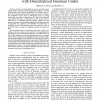143 search results - page 7 / 29 » Randomness versus Fault-Tolerance |
ASIACRYPT
2000
Springer
15 years 3 months ago
2000
Springer
A conference key protocol allows a group of participants to establish a secret communication (conference) key so that all their communications thereafter are protected by the key. ...
102
click to vote
DC
2010
14 years 11 months ago
2010
Abstract Until now, the analysis of fault tolerance of peerto-peer systems usually only covers random faults of some kind. Contrary to traditional algorithmic research, faults as w...
119
click to vote
OPODIS
2004
15 years 1 months ago
2004
Abstract. It appeared recently that some statistical properties of complex networks like the Internet, the World Wide Web or Peer-to-Peer systems have an important influence on the...
EURONGI
2006
Springer
15 years 3 months ago
2006
Springer
Wireless sensor networks (WSNs) pose challenges not present in classical distributed systems: resource limitations, high failure rates, and ad hoc deployment. The lossy nature of w...
INFOCOM
2007
IEEE
15 years 6 months ago
2007
IEEE
Abstract—It may not be feasible for sensor networks monitoring nature and inaccessible geographical regions to include powered sinks with Internet connections. We consider the sc...

